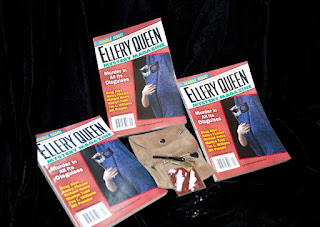I went
in and out of Peru in 1984. It was quick. I left no traces. I loved it. I
attributed my clean sneak to reading the South American Handbook and heeding
the warnings.
I
was a single man then, and I met two single dames, fellow travelers. Libby and
Maureen, a tall brunette and a short blonde. Both were swell. We were all on separate tours, but our character arcs were interwoven.
I'd spend time with one in Lima, another in Arequipa, and so on. The girls were
never in the same town, but there was usually one where I was.
I had
some wonderful moments rattling along on the train through the Urubamba River
Valley. I spent the night at the sanctuary hotel in Machu Picchu, back before
it was a Belmond property. Ran into a little trouble in Arequipa, but nobody
got hurt.
When
I returned to the Black Lizard Lounge, I tried to write a short atmospheric
travel vignette about it. I thought it was a decent first piece in an engaging
voice. But no one wanted to publish my short travel vignette, no matter how
atmospheric. I held on to it in here, where writers hold on to their stories.
I
began to write private eye fiction in 2005. I decided to revamp the Peru travel
piece--weave it into a noir tale. That version flopped, derailed by an online
writing workshop when something I wrote garnered this feedback (true quote):
"That really got my hackles up!" And that comment degenerated into an
online thread of two-weeks duration entitled "Nipples." "It was
chilly that morning in Cusco," I told them. They didn't want to hear it.
Well,
thanks to EQMM, I began to have a little success with my series private eye
character, Frank Swiver. I showed Frank the Peru material.
"OK,
I'll do it," he said.
"This
is just the old version. You haven't even seen your role yet. I haven't written
your lines."
"Doesn't
matter," said Frank, putting out his Camel in my Tommy Bahama ashtray.
"I like the dame in it."
Frank's
always been a rogue, and he recognized a rogue-ish part when he glammed onto
one. So I wrote the story for Frank.
Going
through the material again helped me get some things clear in my mind. Like an
ending, and a less muddled middle. Frank really straightened the story out for
me.
I
thought it was swell stuff now. I showed it to a few old pals as a sanity
check. The pals "got" the story, and seemed to sincerely like it,
too. I showed it to three writers. The writers unanimously condemned it.
Writer 1: "Your
p.i. has lost his moral compass."
Writer 2: "He
has no moral compass."
Writer 3: "We
hate your protagonist. We'll never read another Frank Swiver story."
That
didn't move Frank. "Hey, I did what the client asked, didn't I? It's a
job."
"I'm
taking you off the case, shamus," I said.
"You
can't do that."
You
can let your characters take you all over the map in a story, but you can't let
them tell you what to write. I took Frank off the case. But now, who to give it
to? There weren't many dicks in my bag of dramatis personae. I reached in and
pulled out a Basque-American from Boise, Igor Oxtoa. Igor'd been working the
other end of Post Street from Frank for a couple years, and was ready for prime
time.
Frank
has had some good fortune with the women in my stories. But Igor has never had
any luck with dames. He's shorter, stockier, and just not a smooth operator,
like Frank. But that added a new dimension to the seduction. It was fun
writing, but more importantly I think folks could be more sympathetic with Igor
than they were with Frank.
I
sent it in to EQMM last August. "Too much explicit sex," was the
reply. D'uh. I knew that! I don't know what I was thinking, sending an R-rated
piece to Ellery Queen. All I can figure is brain fade.
"What
if I take out the explicit sex? Would you read it again?" Yes!
I
sent off the PG-13 version. EQMM came back, "You need to cut back on the
drug use."
"What
do you mean? I quit years ago."
"In
the story, bright boy."
Arrrgh!
There is a murder, a stabbing, and an unnatural death from a train, but cocaine
smuggling is the crime that drives this tale. It was tough to clean up the coke
and keep the story line on track. The interesting thing though about working
with Janet Hutchings, each time after I made requested changes, I had a better
story, with pace, tone, dramatic scenes and a fine balance. Best of all Igor
and the rest of the cast were giving me 100%. The little Basque was a natural.
He took to the scenes like a llama takes to the Inca Trail.
Intended
result: EQMM and I finally agreed on a story, "Courvoisier and Coca Tea," and it will appear in the Sept. /
Oct. double issue as the Black Mask feature.
Unintended
consequences: my wife has planned a family trip for us to Peru in July.
We
get questions all the time here at the Black Lizard Lounge. "That's quite
a story. How long did it take you to write it?"
Let's
see, I started in 1985, so about 20 years, I guess. I wasn't working on it the
whole time though . . .

